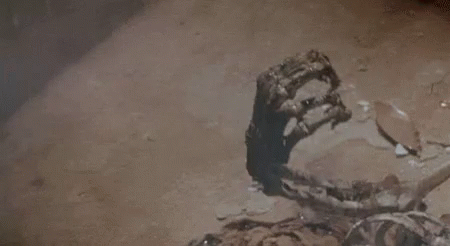I still don't know what compelled me to ask my past Classical Mythology professor which translation of The Iliad and The Odyssey is best, but I did. You'd think translating part of The Aeneid from Latin and studying about Troy/the Trojan War extensively would be enough to repulse me forever; my hidden masochism never ceases to surprise me. Here are my feelings on The Iliad Lattimore translation:
Epic is just a fancy way of saying long. I wouldn't say the poem is completely boring, even though there are lines upon lines describing people through epithets, where they are from, or the fancy adornments that illustrate a detailed scene on a shield. A shield! For 100+ lines. But when there's drama, it's spicy. For example, Achilles talking back at Agamemnon and calling him greedy; Thersites also talking back at Agamemnon. I hate Agamemnon if you can't tell. He finds a "mistress," the mistress' father offers a ransom to get his daughter back, Agamemnon refuses, so the father, who's a priest, asks Apollo to fuck up Agamemnon's life. Agamemnon doesn't think he fucked up that bad, so he's petulant when they ask him to return the girl home. "I want my war spoils. I'm going to take Achilles' girl." You already have a wife. If I were you, I would worry about her because she's going to kill you in the future, so stop bringing ladies home! He's selfish, greedy, and a terrible ruler.
Meanwhile, Achilles is moping somewhere.
See how messy and fun Greek stories can be! That's just books 1 and 2: two books down, 22 to go.
There's more shit-talking, but this time it's from Hector, and it's towards Paris. "Woman-crazy... your looks are handsome, but there is no strength in your heart, not courage" (Lattimore, 39-46). In my opinion, Paris has zero redeeming qualities; he caused the problem and does not proactively try to fix it. Plus, he's a disgusting pig. War is about to get worse because you can't fight, and you're only thinking about sex after Aphrodite saved you?!
Book V and the subsequent books illustrate all the ways people die. I found one of the worst ways to die in Book V: getting speared through the buttcheek, puncturing the bladder. That's rough, buddy. Onto the different ways which Homer tells you the characters die: a mist of darkness clouded both eyes, made moveless his bright limbs, the darkness of night misted over the eyes, etc. What I'm getting at is, their deaths sound poetic to me. There are many deaths throughout the epic, so these pretty words and lengthy chronicles of their genealogy are a nice send-off for the soldiers' valor. That being said, the characters' backgrounds were a pain to read or "keep track of" because they are extensive and plentiful. I won't deny glossing over most of them.
Book VI shows a glimpse of what it's like to be a mortal woman. The women can only hide and wait for the men in their lives to come back; they wait for news of their loved ones' passing; they can only wait for the city to be sacked and to be given away as property. Women have no power. Another notable person in this section is Helen. She calls herself a "nasty bitch evil-intriguing" and other self-deprecating things in her monologue (Lattimore translation, VI, 343-358). I believe she also called herself a slut a couple of books/lines back. I don't have an analysis; this just stood out to me. She calls herself this/accepts the blame because no one will blame Paris (the man.) A couple of books later, Briseis is introduced. Briseis was Achille's war spoils after he sacked her city. War spoils become mistresses—sometimes wives, which Briseis was promised—or servants to their masters. I bring this up for two reasons: women are viewed as objects, and the captured fall in love with their captors...
On the divine side. Women also have no power. Hera has little power to sway Zeus; she resorts to using her body and sexuality to get what she wants. This leads to the narrative: no matter what titles or prestige a woman has, her power lies solely in sexuality. Then there's that horrible little tiff between Apollo and Artemis. Artemis does not have the same glory as her twin brother. When the gods are allowed to intervene however they choose in the war, Artemis enters as comic-relief. She tries to stop her brother, but she storms away crying after some harsh words from her brother! Apparently, women are only sexual creatures prone to emotional outbursts over the smallest admonishment.
I think it's tough being the gods in this story, specifically Athena. She sides with the Achaians, but the Trojans also make offerings to gain her aid and blessing. The divine intervention makes the story so convoluted and never-ending. The gods fight amongst themselves; they want to protect their champions/children. It almost seems like it would be better if the gods never intervened. To think all these started because of sore losers in a beauty pageant.
Truly, the end (and the story) is too dragged out. I was already bored with the battles and the violence; no more games, please, literally. When I could keep my eyes open, there were passages with lovely, enjoyable prose.




No comments:
Post a Comment
Let's discuss!